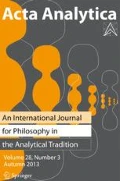Abstract
Is it true that all conversational implicatures are cancellable? In some recent works (Weiner Analysis 66(2):127–130, 2004, followed by Blome-Tillmann Analysis 68(2):156–160, 2008 and, most recently, by Hazlett 2012), the property of cancellability that, according to Grice (1989), conversational implicatures must possess has been called into question. The aim of this article is to show that the cases on which Weiner builds his argument—the Train Case and the Sex Pistols Case— do not really suffice to endanger Grice’s Cancellability Hypothesis. What Weiner has shown with his examples is that a conversational implicature cannot be cancelled if the speaker, whose utterance gives rise to the implicature, does not intend to cancel it. To implicate is an intentional speech act and, therefore, cancelling an implicature must also be intentional and must be performed by the same speaker whose utterance gives rise to the putative implicature.
Similar content being viewed by others
Notes
Some of these lectures have been collected and published in Grice 1989.
See, in this sense, Davis 2010.
For an overview of the Cooperative Principle and its conversational maxims, as defined by Grice, see Grice (1989: 26 ff.).
For the notion of conversational implicature, as characterized by Grice, see Grice (1989: 31):
A general pattern for the working out of a conversational implicature might be given as follows: ‘He has said that p; there is no reason to suppose that he is not observing the maxims, or at least the Cooperative Principle; he could not be doing this unless he thought that q; he knows (and knows that I know that he knows) that I can see that the supposition that he thinks that q is required; he has done nothing to stop me thinking that q; he intends me to think, or is at least willing to allow me to think, that q; and so he has implicated that q.’
I am not sure if Weiner can be trusted to interpret the Sex Pistols correctly. He claims that the song ‘God save the Queen’ conveys the message ‘Down with the Queen,’ but this interpretation is questionable. As a matter of fact, in recent interviews, Lydon (Johnny Rotten) has distanced himself from the use of the song as a statement against the monarchy (http://www.bbc.co.uk/news/entertainment-arts-17746811). However, for the purpose of the present study, I will assume that Weiner’s interpretation is correct.
In this quotation, (2) and (3) correspond respectively to (4.2) and (4.3) in my text.
In this quotation, (1) and (2) correspond respectively to (3.1) and (3.2) in my text.
A different line of reasoning was suggested to me by an anonymous reviewer, namely that, when the speaker conversationally implicates that Alice should move, then it is presupposed that she can move (though not conversationally implicated). I agree with this analysis if we assume that the speaker’s utterance triggers a first degree implicature that Alice should move. For instance, imagine that, in the same Train Case scenario, Sarah looks angrily at Alice and says ‘Where are your manners?’ In this case, Sarah is conversationally implicating that Alice should move and make room. Moreover, Sarah is taking for granted that Alice is physically able to move. Therefore, following the suggestion proposed by my reviewer, we could claim that the speaker, by implicating the should-clause, is presupposing the could-clause. However, differently from this example, in the Train Case as presented by Weiner, the shoud-clause is not attached to Sarah’s utterance, but to its implicature (‘I know perfectly well that you are able to make room for someone else’). Therefore, I rather maintain that the could-clause is implicated (as a first degree implicature), not presupposed.
Grice 1989: 34.
The symbol ‘+>’ means ‘conversationally implicates.’
References
Blome-Tillmann, M. (2008). Conversational implicature and the cancellability test. Analysis, 68(2), 156–160.
Borge, S. (2009). Conversational implicatures and cancellability. Acta Analytica, 24, 149–154.
Bryant, G. A. (2011). Verbal irony in the wild. Pragmatics and Cognition, 19(2), 291–309.
Davis, W. (2010). Implicature. In: The Stanford Encyclopedia of Philosophy (Winter 2010 Edition), Edward N. Zalta (ed.), URL = <http://plato.stanford.edu/archives/win2010/entries/implicature/>. Cited 14 May 2012.
Grice, P. (1989). Studies in the way of words. Cambridge, Mass: Harvard University Press.
Hazlett, A. (2012). Factive Presupposition and the Truth Condition on Knowledge. Acta Analytica (in press). DOI: 10.1007/s12136-012-0163-3.
Jackendoff, R. (2006). The peculiar logic of value. Journal of Cognition and Culture, 6(3–4), 375–407.
Jackendoff, R. (2007). Language, consciousness, culture. Essays on mental structure. Cambridge, Mass: The MIT Press.
Kreuz, R. J., & Roberts, R. M. (1995). Two cues for verbal irony: hyperbole and the ironic tone of voice. Metaphor and Symbolic Activity, 10(1), 21–31.
Searle, J. R. (1975). Indirect speech acts. In P. Cole & J. L. Morgan (Eds.), Syntax and semantics, volume 3: speech acts (pp. 59–82). New York: Academic Press.
Weiner, M. (2006). Are all conversational implicatures cancellable? Analysis, 66(2), 127–130.
Acknowledgments
I wish to thank Christian Dahlman for encouragement and inspiring discussions on the topic of this article. Moreover, I am indebted to Annabel Curto and Anna Wärnsby for precious editing suggestions. My sincere gratitude goes to an anonymous reviewer of Acta Analytica for his/her valuable comments.
Author information
Authors and Affiliations
Corresponding author
Rights and permissions
About this article
Cite this article
Colonna Dahlman, R. Conversational Implicatures Are Still Cancellable. Acta Anal 28, 321–327 (2013). https://doi.org/10.1007/s12136-012-0177-x
Received:
Accepted:
Published:
Issue Date:
DOI: https://doi.org/10.1007/s12136-012-0177-x



